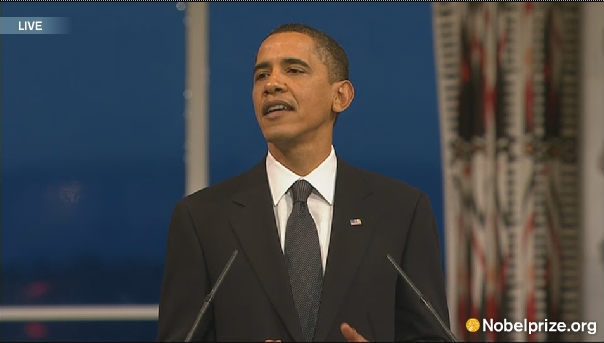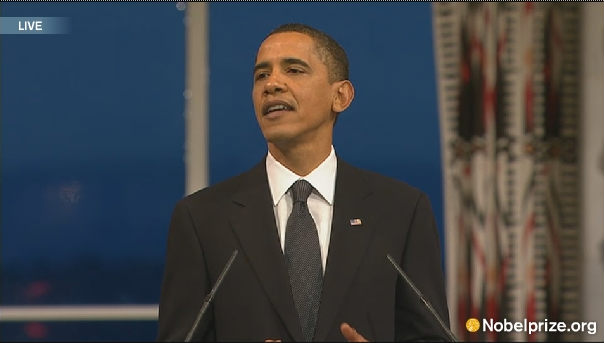 President Obama delivers his Nobel Peace Prize acceptance speech. Photo: Nobelprize.org
President Obama delivers his Nobel Peace Prize acceptance speech. Photo: Nobelprize.org
In accepting the Nobel Peace Prize in Oslo today, President Obama touched briefly on the issue of climate change, lumping it in with a laundry list of “soft” issues like economic security, food security, and education.
Here’s the excerpt, which came very late in the speech:
…a just peace includes not only civil and political rights – it must encompass economic security and opportunity. For true peace is not just freedom from fear, but freedom from want.
It is undoubtedly true that development rarely takes root without security; it is also true that security does not exist where human beings do not have access to enough food, or clean water, or the medicine they need to survive. It does not exist where children cannot aspire to a decent education or a job that supports a family. The absence of hope can rot a society from within.
And that is why helping farmers feed their own people – or nations educate their children and care for the sick – is not mere charity. It is also why the world must come together to confront climate change. There is little scientific dispute that if we do nothing, we will face more drought, famine and mass displacement that will fuel more conflict for decades. For this reason, it is not merely scientists and activists who call for swift and forceful action – it is military leaders in my country and others who understand that our common security hangs in the balance. (Text as prepared for delivery)
Obama’s brief references to climate were clearly influenced by politics back home in America. First, his statement that there is “little scientific dispute” about climate science was a rejoinder to Sarah Palin and the vocal climate denier community. And the lumping of climate with national security is aimed at Americans’ almost universal view that any president should do whatever it takes to protect the country from outside threats.
Obama was much more direct about climate change earlier in the day, during a brief press availability after his meeting with Norway’s prime minister, Jens Stoltenberg:
Something that obviously is pressing right now is the issue of climate change, and the Prime Minister and I discussed the ongoing meeting in Copenhagen, in which we’re both strongly committed to a positive outcome. The United States has done a lot of work this year to transform the way we think about energy and our use back home, and to help to move international climate negotiations forward in an effective way. And I look forward to coming back this way next week during the leaders’ summit that ends the conference.
Prime Minister Stoltenberg and I also discussed how we can work together and with other countries to protect forests — something that he has personally championed and I’m very impressed with the model that has been built between Norway and Brazil that allows for effective monitoring and ensures that we are making progress in avoiding deforestation of the Amazon. And we all understand that it’s probably the most cost-effective way for us to address the issue of climate change — having an effective set of mechanisms in place to avoid further deforestation and hopefully to plant new trees.
In presenting the award to Obama, Thorbjørn Jagland, Chairman of the Norwegian Nobel Committee, only briefly touched on the climate issue, first in a punny reference:
From the very first moment of his presidency, President Obama has been trying to create a more cooperative climate which can help reverse the present trend. He has already “lowered the temperature in the world”, in the words of former Peace Prize Laureate Desmond Tutu.
… and later more seriously:
Regarding the fight against climate change, we can see the same underlying idea: the U.S.A. cannot be indifferent to global challenges; while it cannot solve such challenges alone, they cannot be met without the U.S.A. Obama has presented concrete proposals for what the U.S.A. will do. This has improved chances of reaching an effective global agreement, if not this year then, we hope, at least next year.
Meanwhile, another world leader was making a more direct and emphatic appeal on the climate issue. French President Nicolas Sarkozy urged a 30 percent reduction in greenhouse gas emissions worldwide “as soon as possible,” according to Agence France-Presse.


